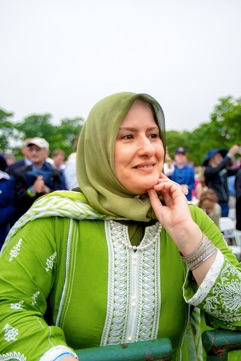The New American stories begin here.

Aymann Ismail
This past Fourth of July I visited a rain-drenched Monticello with a Slate colleague, to do as I first did a decade ago with my husband and young sons: watch new Americans be sworn in as citizens at Thomas Jefferson’s beautiful Virginia estate. At first the unusually dismal weather seemed to mirror the frightening discourse around immigrants and immigration that has marked this past year: warnings that as a group immigrants are dangerous, that they are taking our jobs, that they have dubious loyalties, that they need to be kept out to protect some idealized version of America. Yet every new citizen we encountered didn’t seem much affected by the anti-immigrant rhetoric. To be sure, they all said they planned to vote. Most admitted that they worry about this country turning toward isolationism and fear. But to a one, they expressed confidence that most Americans they know don’t think this way.
Herein lies the gap in the way we have talked about who counts as an American this past year. A lot has been said, from all sides and from lofty places, about the role immigrants play in this society. But not enough has been heard from the immigrants themselves.
This fall I had the privilege of conducting interviews with six people who were sworn in as citizens in 2016—three of whom I met at Monticello this past July, and three others from Washington, D.C., and New York. One person I spoke to came to the U.S. through a refugee camp, a difficult experience that deeply affected him. Another came for an American education, as I did, and never went home. Not everyone came here legally. They all described what it means to officially become American in this fraught historical moment. Yet, strikingly, they seem less depressed about the current divide over immigration than I am. They are sad about it, but it has not made them feel less at home.
I was fascinated by the complicated ways these new citizens speak of “home.” A few people I interviewed feel perfectly at home in the U.S., and others openly long for something or someone left behind. Most live somewhere between the two extremes. But they all speak of freedom, of mobility, of education, and of the possibilities for their children in almost rapturous ways. They can become themselves here, and their children will be fully themselves in ways their own parents couldn’t have imagined.
These interviews have been the brightest spot of this long election season for me. You can read edited versions below, and I encourage you to listen to the voices of these new Americans in the embedded audio players or on Slate’s podcast feed. They are a reminder that what makes this country great is not captured by political rhetoric or overheated headlines. The stories are evidence, entered into the record, of the fact that what makes Americans American isn’t provenance or pedigree, but their belief that the United States makes them greater. And that they make it greater in return.
Click on the links below each portrait to read their stories.
“I’m going to wake up and realize I’m still undocumented.” Read Liana Montecinos’ story.
“My son will not be a refugee.” Read Amjad Alsrya’s story.
“Oh my God, I’m an American now!” Read Rosa Molina’s story.
“The first day I arrived my mother took me to Gimbels.” Read Kelebohile Nkhereanye’s story.
“I’ve never voted in my life, at age 45.” Read Judith Christian’s story.
“I want the kids to know we are in our country.” Read Nawal Alshamaa’s story.
Audio production by Tony Field. Video production by Aymann Ismail. Illustrations by Charlie Powell. Laura Wagner, Catherine Piner, and Laura Sim contributed to this project.